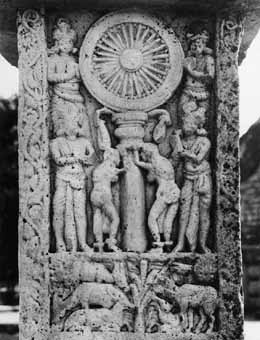|
 |
==1950==
Dr.
Ambedkar gave several addresses about Buddhism; in May,
he flew to Colombo (*site*), in Sri Lanka, to pursue
further Buddhist connections. Here is a modern scholar's
view: *"Pragmatism, Persuasion, and Force in
Bhimrao Ambedkar's Reconstruction of Buddhism"*.
|
 |
| ==1951==
In
February, he introduced in Parliament the "Hindu Code
Bill" that he had drafted, which included greatly
expanded rights for women; it proved very controversial,
and consideration of it was postponed: *on the Hindu Code Bill* (see #8).
(--*Kadam*,
pp. 121-22) |
 |
| ==1951==
In
September, Dr. Ambedkar resigned from the Cabinet,
embittered over the failure of Nehru and the Congress to
back the Hindu Code Bill as they had earlier pledged to
do. He became the *Leader of the Opposition* (see
#9.) Discussion: *The Hindu*; *Time Magazine*. (--*Kadam*, pp. 121-22) |
 |
| ==1952==
Dr.
Ambedkar received an honorary L.L.D. degree from
Columbia University as part of its Bicentennial Special
Convocation. The President described him as "one of
India's leading citizens--a great social reformer and a
valiant upholder of human rights." |
 |
==1953==
He gave a trenchant and pessimistic *interview to
the BBC* about the prospects for democracy in
India. His political thinking also included
analysis of the issue of linguistic states; he published
*"Need for Checks and Balances"* (Times
of India, April 23, 1953) on this question. In
1955, he was still working on the subject, as the
preface (dated Dec. 23, 1955) to *"Thoughts on Linguistic States"*
testified.
|
 |
| ==1954==
In
the midst of his round of (increasingly embittered)
Parliamentary and other activity, his health gave way;
he was confined to bed for two months. |
 |
| ==1954==
While
dedicating a new Buddhist vihara near Poona, Dr.
Ambedkar announced that he was writing a book on
Buddhism, and that as soon as it was finished, he
planned to make a formal conversion to Buddhism. He also
claimed that the image of Vithoba at Pandharpur (*site*) was in reality an image of
the Buddha, and said that he would write a thesis to
prove this claim. (--*Keer*, p. 482.) |
 |
| ==1955==
Dr. Ambedkar gave an *iconic interview to the BBC*,
in which he discussed his views about Gandhi and the
modern political scene in India. |
 |
| ==1956==
Dr. Ambedkar brought the manuscript of *"The
Buddha
and His Dhamma"* to completion. "In
February 1956 two new chapters were added to it: 'There
is no god'; 'There is no soul'.... On March 15, 1956,
Ambedkar wrote the Preface to his book in his own
handwriting and dictated it to Rattu [his secretary]."
Printing began in May, but was slowed by constant
last-minute revisions of the proofs. (--*Keer*, pp. 488-489,
491.) This
work can perhaps be seen as the culmination of his reading and thought during the 1940's. |
 |
| ==1956==
From June to October, he was bedridden in his Delhi
residence. His eyes were failing, he suffered from side
effects of the drugs he was given for his diabetes, he
felt deeply depressed. |
 |
| ==1956==
His formal conversion took place on Oct. 14th in Nagpur,
a town selected for reasons he explained in his moving
speech, *"Why Was Nagpur Chosen?"*. Many
thousands of Mahars and other Dalits accepted Buddhism
along with him. |
 |
| ==1956==
In November, he flew to Kathmandu to attend the Fourth
World Buddhist Conference. |
 |
| ==1956==
On Dec. 2, he completed the manuscript of *"The Buddha or Karl Marx"*, his
last finished work, and gave it for typing. |
 |
| ==1956==
On the night of Dec. 5 or the early morning of Dec. 6,
he died quietly in his sleep; on Dec. 7 there was a huge
Buddhist-style funeral procession in Bombay, and he was
cremated on the seashore. |
 |
| ==1957==
*"The Buddha and His Dhamma"*, Dr.
Ambedkar's own version of a Buddhist scripture for his
people, was posthumously published, by Siddharth College
Publications, Bombay. |
 |
| ==1957
and beyond== A number of unfinished
typescripts and handwritten drafts were found among his
notes and papers and gradually made available. Among
these were *"Waiting for a Visa"*, which
probably dates from 1935-36, and *"Untouchables, or the Children of
India's Ghetto"*, which refers to the census of
1951 and so must be quite late; other unpublished
fragments as well will be found on the *ambedkar.org*
website. |
 |
| == on to the years since
== |
|
